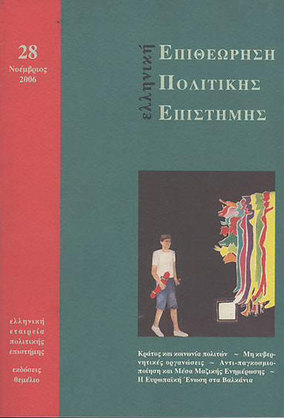Κοινωνικές τάξεις και πολιτική στις ανεπτυγμένες βιομηχανικές κοινωνίες
Part of : Ελληνική Επιθεώρηση Πολιτικής Επιστήμης ; No.4, 1994, pages 5-24
Issue:
Pages:
5-24
Parallel Title:
Class and politics in advanced industrial societies
Author:
Abstract:
The article begins with a brief discussion of analyses which argue (a) that class cleavages and conflict cannot be considered as an «engine of history» in the late twentieth century and (b) that class is irrelevant in everyday life and, especially, to electoral behaviour and politics in liberal democracies.The author takes issue with various adherents to the «decline of class politics» thesis and argues that the major problems in these analyses stem from their inadequate conceptualization of class and from their crude treatment of political parties. These conceptual inadequancies result from (a) the dichotomous conceptualization of class, i.e., working class versus non-working class and (b) a lop-sided emphasis and focus on parties of the left rather than of the whole ideological spectrum. In turn, these problems make it difficult to identify organizational changes at the party level and to assess their influence on voting patterns related to class.After carefully examining a number of empirical country studies (France, Ireland, the Netherlands, Sweden, the United Kingdom, and the United States), the author proceeds convincingly to challenge these analyses on the basis of their theoretical and/or technical assumptions. The article concludes that class remains an important factor in the operation of democratic politics, while stressing that it is not, and never has been, the sole factor determining the social and political behaviour of voters.
Subject:
Subject (LC):
Keywords:
κοινωνικές τάξεις, ανεπτυγμένες χώρες




